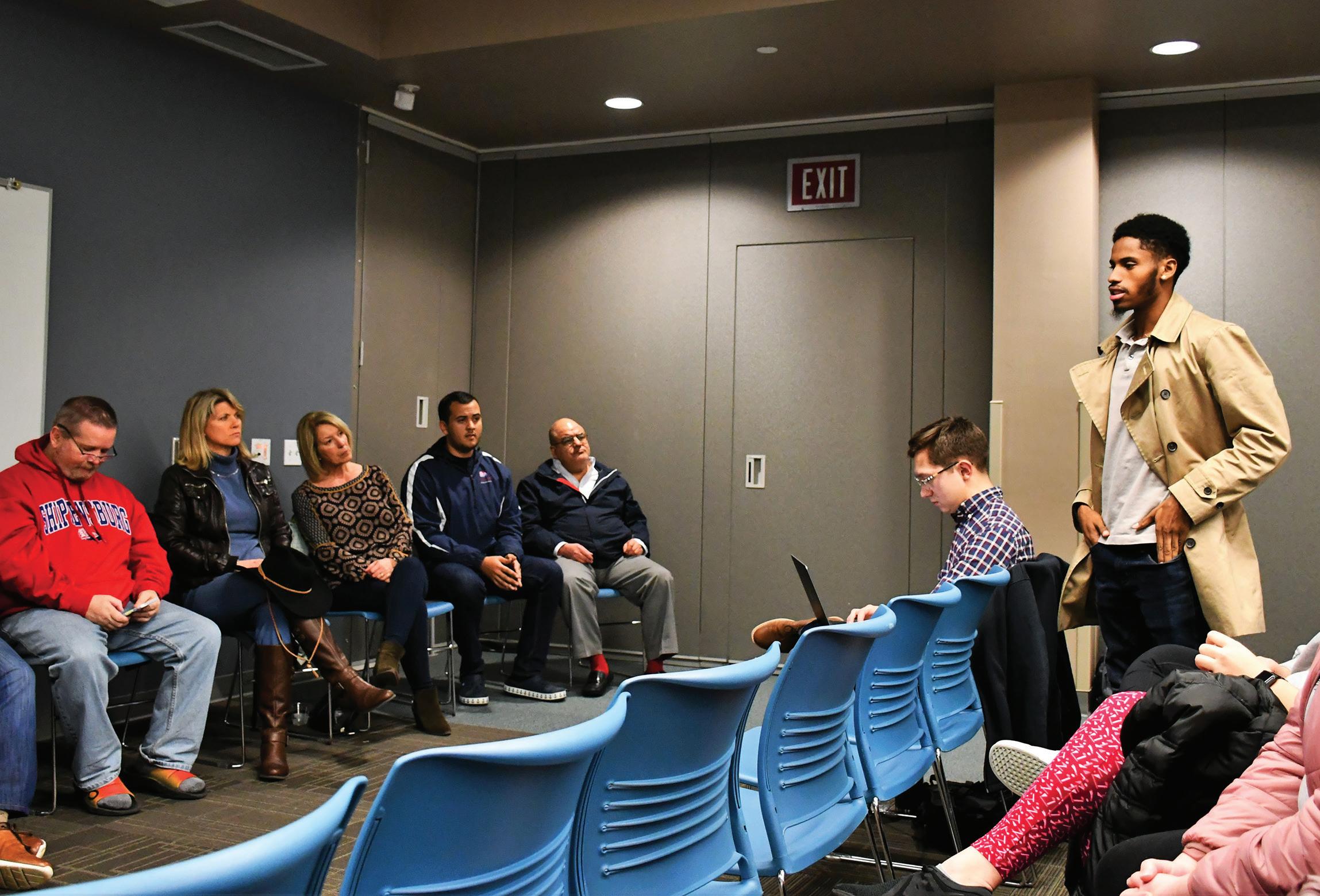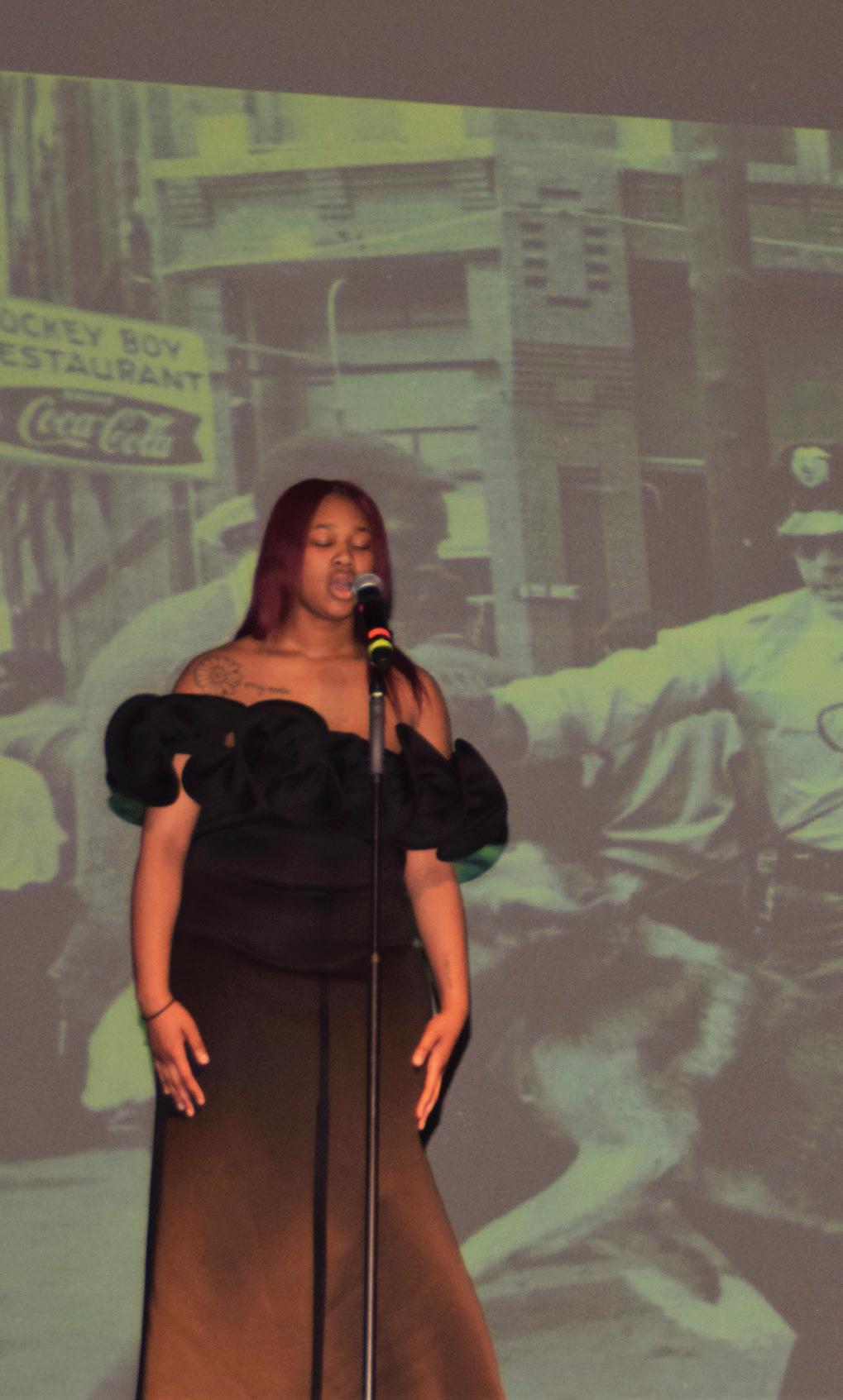
5 minute read
Blumhouse’s Fantasy Island
from The Slate 3-3-20
by The Slate
He also emphasized how important communication is throughout the System Redesign process.
Sarah Grove, an SU political science professor, and representative to the interim faculty council, said her concerns for the five-year plan to implement changes will gut adjuncts from departments and impact programs.
Advertisement
She also said professors are trained for their own subjects and are not equipped to teach others.
“It is disingenuous to start advertising that we have an engineering program when you don’t have some of the heart and soul of the program, which is physics,” Grove said.
SU President Laurie Carter responded to Grove by explaining there are two different processes occurring — the sustainability plan and the work, planning and budget council. There is some overlap; however, the plans are separate.
“It is in the best interest of our students to fix our deficit now so we can begin to invest in our programs,” Carter said. “We’re not gutting our programs.”
She added there will be some outcomes people do not like.
Kara Laskowski, SU Association of Pennsylvania State College and University Faculties (APSCUF) chapter president, criticized Greenstein’s communication about the sustainability plans.
“We need you to be consistent with us,” Laskowski said. “We need that consistency with the message of shared governance.”
She also discussed recent news that PASSHE could consider “retrenchment” and the possibly of cutting positions if the State System does not reach 200 faculty members for its early retirement incentive by March 2. The Pittsburgh Post-Gazette reported Monday that 202 faculty members agreed to take early retirement.
Greenstein responded by discussing literary theory in which the reader can create a narrative from what they are reading based on their perspective and experiences.
“From my perspective, there is only consistency,” he said.
Greenstein again emphasized the importance of communication and transparency.
The chancellor answered questions for an hour before the conclusion of the event. Greenstein met with members of the Student Government Association later in the afternoon, holding an open conversation about the System Redesign, scholarships and how classes shared across the system could work in the future.
Students were not officially invited to the event, which was held from 11 a.m.–12:15 p.m.
Graphic courtesy of Tim Hawkins/Department of Geography and Earth Science February set a record high of 68 degrees, and was the 11th warmest February since records began, according to Tim Hawkins, SU geography and earth science professor. This was the third February with zero measurable snowfall.
Inmate seeks end to solitary

Carmine Sccichitano/The Slate Lance Hines-Butts asks the panelists about making welcome programs for transfer students. Students can ask questions and voice concerns during the President’s Hours held in residence halls throughout the semester.
From “PRESIDENT’S HOUR,” A1
One student asked if the tuition rate would stay frozen like it had been for the 2019–20 academic year or if students should expect an increase.
The tuition had not been discussed yet but the final decision on tuition will be made by the board of governors in April, Carter said. SGA President Aven Bittinger, said he will personally advocate for another freeze in tuition for the 2020-2021 school year.
One student asked about the possibility of adding more cameras to campus parking lots, so students have proof that their car is damaged when they go to report it. Barton said they have been updating the cameras on campus for some time and will continue to do so. As part of this, the cameras will be installed in many new locations on campus to provide better security, he said.
RHA-sponsored President’s Hours are held at various points throughout the semester.
Read more of The Slate at theslateonline.com
over refusal to cut dreadlocks
Mark Scolforo Associated Press
HARRISBURG, Pa. (AP) — An inmate awaiting trial in a shooting case wants a federal judge to release him from solitary confinement in a central Pennsylvania county jail, where he has been for more than a year because he refuses to cut dreadlocks that hold religious significance for him.
The hand-written lawsuit filed in October by Eric S. McGill Jr. against three senior administrators at the Lebanon County Correctional Facility shifted gears last week, when a group of lawyers produced an amended complaint that warned McGill’s mental health is deteriorating.
It said McGill, 27, of Lebanon, an adherent of Rastafarianism, suffers anxiety attacks two or three times a week, and they are usually triggered by thoughts of his jail conditions and placement in solitary.
“By keeping Mr. McGill in solitary confinement because he refuses to cut off his dreadlocks, (the) defendants have inhibited his right to free exercise of religion for no legitimate penological purpose,” his lawyers with the Pennsylvania Institutional Law Project told the court last week, seeking an order that he be placed in the jail’s general population, as well as damages.
Lebanon County’s lawyer for labor and employment matters, Peggy Morcom, declined to comment Tuesday, citing a practice of not discussing litigation. But in a pair of filings two months ago, she argued that state law lets county jails set inmate hair styles so that they “comply with sanitation and security policies.”
The county argues its policy was established because inmates could hide contraband, as well as to “ensure security and cleanliness.” It also cited a 2006 state Commonwealth Court decision involving the state Department of Corrections that Morcom wrote “held that the legitimate interests of the correctional facility outweighed any rights the prisoner had” to wear hair in dreadlocks.
The state prison system amended its inmate grooming policy in July 2016, and inmates currently have no restriction on the length of their hair. State inmates can be subject to searches of their hair, including by having their own fingers run through their hair. Dreadlocks can be checked with a handheld metal detector.
Those rules do not apply to county jails, such as the Lebanon County Correctional Facility.
“Plaintiff was repeatedly offered the opportunity to obtain a haircut pursuant to the haircut procedures to remove his dreadlocks,” Morcom wrote last month. “Plaintiff refused to remove his dreadlocks.”
His lawyers say McGill believes his spirit lives through his dreadlocks and that he would lose strength and essence needed for the afterlife were he to cut them.
McGill gets one hour outside of his cell in the security housing unit, five days a week, between midnight and 2 a.m. That is also the time when he may phone his family.
McGill is scheduled for trial in late March on multiple counts of attempted homicide, aggravated assault and other crimes in connection with a January 2019 shooting that injured four people. Police said they heard gunfire at about 5 a.m. on a Saturday and chased a vehicle without its lights on. Two guns were thrown from the car before it was stopped. McGill was arrested after a foot chase, police said, and jailed on $1 million bail.
Students celebrate Black History Month in showcase








